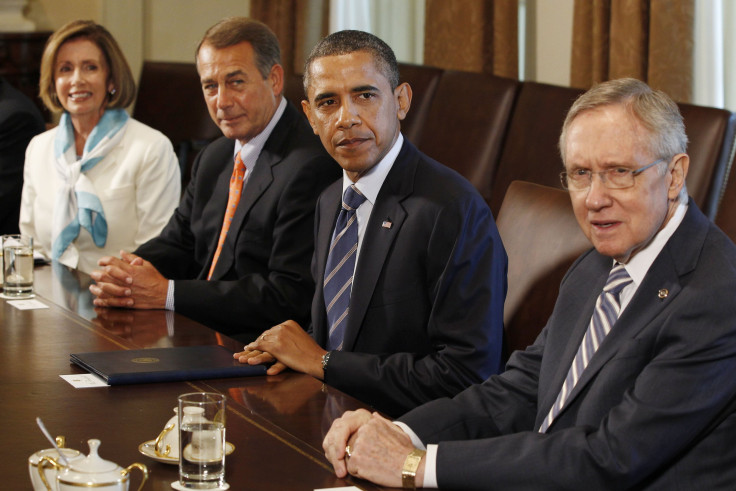Sequester Cuts 2013: Obama To Meet Congressional Leaders Friday

After weeks of finger-pointing, President Barack Obama is expected to sit down with congressional leaders on Friday to discuss the impending sequester that will cut $85 billion in spending from the defense and domestic budget for the rest of 2013.
Multiple news agencies are reporting that the president will meet with House Speaker John Boehner, R-Ohio, Senate Majority Leader Harry Reid, D-Nev., House Minority Leader Nancy Pelosi, D-Calif., and Senate Minority Leader Mitch McConnell, R-Ky.
When the two sides come together on Friday, it will be first meeting in which they try to broker a deal that averts sequestration. The sequester will have already begun, at midnight that same day, since the meeting falls on the March 1 deadline.
Both sides have been playing the blame game for the past couple of weeks, because they have different opinions on how to prevent the automatic defense and nondefense spending cuts. Congressional Republicans and the White House have butted heads over whether new tax revenues should be included in the sequester solution.
Still, Republicans are wary.
“If the president is serious about stopping the sequester, why did he schedule a meeting on Tuesday for Friday when the sequester hits at midnight on Thursday?” NBC News quoted a Republican aide. “Either someone needs to buy the White House a calendar or this is just a belated farce. They ought to at least pretend to try.”
McConnell has also told the media through a statement that Friday’s meeting is also an opportunity to talk with Obama about how lawmakers can “keep our commitment to reduce Washington spending.”
“With a $16.6 trillion national debt and a promise to the American people to address it, one thing is perfectly clear: We will cut Washington spending,” he said. “We can either secure those reductions more intelligently, or we can do it the president’s way with across-the board cuts. But one thing Americans simply will not accept is another tax increase to replace spending reductions we already agreed to.”
In a press statement on Wednesday, McConnell also said the public “sent a divided government here to Washington. They expect it to work. The president may not like that fact -- he may wish things were different -- but he wasn’t elected to work with the Congress he wants. He was elected to work with the Congress he has. And that means working with both parties to get things done. It means leaving the gimmicks behind and working with us to hammer out a smarter solution to his sequester.”
When the sequester hits Friday, it could be weeks before the effects are felt -- still, approximately 750,000 people could lose their jobs. Furlough notices for federal employees would be among the first actions taken by the government.
But some departments have already begun to act to head off the impact of the cuts.
The Department of Homeland Security began releasing hundreds of illegal immigrants held in facilities across the country under supervised release.
DHS spokeswoman Gillian Christensen told the Boston Globe that its “priority that detention remains on serious criminal offenders and other individuals who pose a significant threat to public safety.”
In the meantime, Democrats are ready to go with a $110 billion sequester-alternative bill that includes new tax revenue and spending cuts. That measure is unlikely to be accepted by the GOP, because taxes are included.
And with sequester just two days out, Senate Republicans are reportedly divided on their own replacement plan for the automatic spending cuts.
According to the Hill, the Republicans’ measure would call for $85 billion in spending cuts but give the president the flexibility to manage spending reductions. However, Sen. John McCain, R-Ariz., and Lindsey Graham, R-S.C., are arguing that the plan does nothing to deal with the potential damage the cuts would put on the military.
“I don’t care how flexible you want to be -- the top-line numbers don’t add up to me on defense,” Graham said. “That’s my problem.”
© Copyright IBTimes 2025. All rights reserved.






















